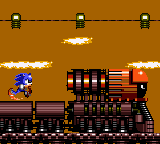Marve Shupopolus-Gou
From Sonic Retro
| |
Sonic the Hedgehog Triple Trouble |
| Bosses |
| Marve Shupopolus-Gou |
| Marve Shupopolus-Gou |
|---|
| Game: Sonic the Hedgehog Triple Trouble |
| Level: Sunset Park Zone |
| Hits to defeat: 3 |
Marve Shupopolus-Gou (マーベ シュポポラス号)[1] is the boss of Sunset Park Zone, and the second in Sonic the Hedgehog Triple Trouble. As in Triple Trouble's predecessor, Sonic Chaos, Dr. Eggman has dispatched this larger Badnik to attack Sonic and Tails.
Sunset Park Zone's boss is one of the most popular from any 8-bit Sonic game; largely because of the background music that plays during the Act before the boss encounter. This music was in fact an unused track from Sonic Chaos, and is accessible in that game's Sound Test.
Strategy
Passing the Bonus Panel of Act 2, Sonic/Tails ends up standing on top of the cargo containers of an immense robotic train. Instead of showing a score tally screen, the Bonus Panel suddenly falls off the train as it departs, and the player is seamlessly transitioned into Act 3. Automatic scroll kicks in, and the player has to race along the back of the moving locomotive, leaping between cargo cars and dodging waves of flying Bombaberry Badniks.
After avoiding all of the obstacles, the player will eventually reach the front car itself: the Marve Shupopolus-Gou. The train-bot will attack the player by firing bombs from the rear-facing cannon on its boiler, which the player must avoid by jumping over. The player has to be careful not to get hit, as lost Rings will fall off the train and become unrecoverable. Attacking the main car of the train three times will destroy the head and cause the train to grind to a screeching halt. Afterwards, Sonic/Tails will Spin Dash to the next Zone.
Name origin
The boss' name comes from the Japanese "shupo-shupo", for the sound a steam train makes.
References
| Sonic the Hedgehog Triple Trouble | |
|---|---|
|
Main page Manuals |
show;hide
Comics:
|

















